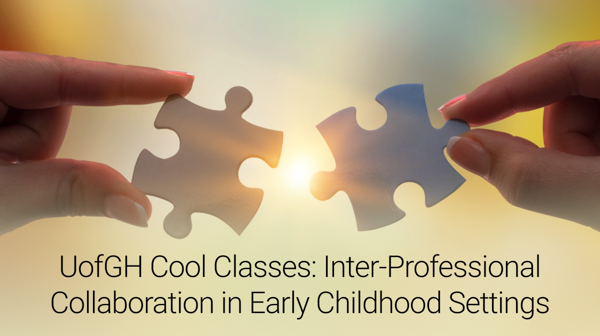
Why is this course interesting?
It’s important for early childhood professionals to understand the importance of taking a multidisciplinary approach when working with children. This may include working with other professionals such as speech and language pathologists, occupational therapists, and psychologists. In the required fourth-year course Inter-Professional Collaboration in Early Childhood Settings, Early Childhood Studies students will learn about the other professionals they may collaborate with, and the importance of their own role.
“As early childhood professionals, we get to know the whole child. We know all of their development – how they grow and learn, and how they get to be who they are; where other professionals – the speech and language pathologist, the occupational therapist, the psychologist – know pieces of a child,” says Dr. Elena Merenda, Assistant Program Head of ECS at UofGH. “We’re able to take all of that knowledge, and all of those results of assessments, for example, and we can create a program to meet the needs of the whole child. So the idea of this course is to learn what the role of the different professionals is, and how the early childhood professional can work with those various people.”
What will you learn?
The course highlights what it is to be an early childhood professional and how they work with other professionals, says Dr. Nikki Martyn, Program Head of ECS.
“If we have an early childhood professional who understands not only their role, but also knows how to interact with professionals in other fields, to be able to develop a plan that encompasses the whole child and whole family to make it meaningful to them – that is real change, and what makes a difference to the child.”
Students are introduced to a new professional weekly through case studies, guest speakers, and role plays. Students also learn transferable skills in the ECS program that can open up different career possibilities, and this course exposes students to those related professions. “What can also come out of this course is students understanding how their skills are transferable as an early childhood studies grad,” says Dr. Merenda. “Our students may go into different areas of the field – they may go into early learning and care, they may go into teachers’ college teaching in elementary schools, speech and language, occupational therapy, therapeutic schools – and as they do work with other professionals, they will learn what their role is in that team.”
What will you take away?
The Inter-Professional Collaboration in Early Childhood Settings course is a culmination of the knowledge students have gained throughout their years at UofGH. “It is one of our capstone courses that will bring together a lot of our fundamental learning that students do throughout the four years, to be able to bring it together to understand who they are, and we hope this course will push their understanding and confidence, and understand their role and impact in the world,” says Dr. Martyn.
She says she also hopes students will come away from the course understanding the importance of different perspectives.
“I hope students gain the knowledge, understanding and experience, through the case studies and role playing, of how important it is for different perspectives to come to the table and share. That’s where great ideas come from – when we see a different angle of the same child, you’re able to understand something a little differently,” she says.
“By understanding all the perspectives and visions the different professionals bring to the same child, students are able to understand new possibilities for working with children and new opportunities for how they can make peoples’ lives better.”
Dr. Merenda adds: “What will hopefully come out is confidence, because that is one thing our field lacks. Students will leave here with the confidence and a voice, and can advocate for children and they have a seat at the table with the other professionals.”







